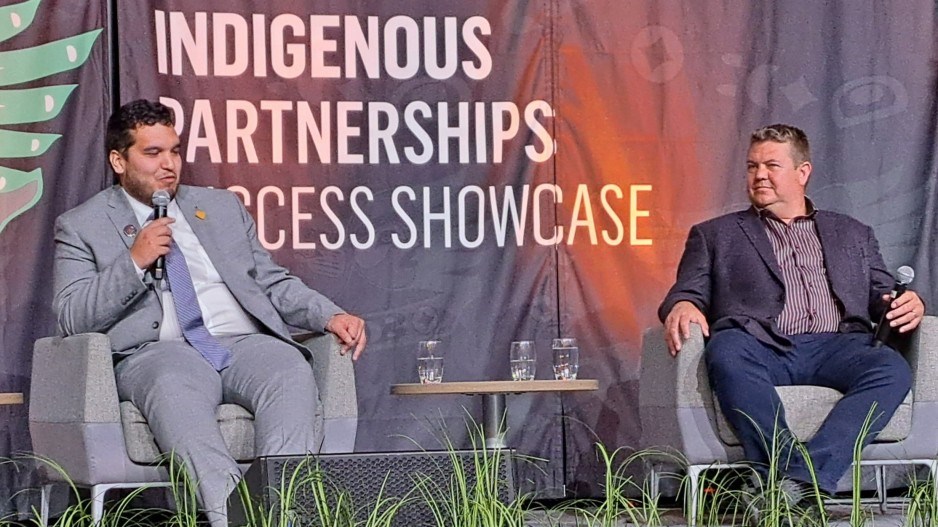In 2021, the small remote First Nation community of Kitasoo-Xai’xais signed a major supply agreement with Wal Mart Canada to supply the company with its Klemtu Spirit smoked salmon.
The salmon comes from the six Atlantic salmon farms that Mowi Canada operates in the Klemtu area, and is smoked in an old fish processing plant that the Kitasoo-Xai’xais took over after it shut down in the 1990s with the decline of the commercial Pacific salmon fishery.
About half of the jobs that employ Kitasoo-Xai’xais now come from salmon farming or processing.
“We have a 99 per cent employment rate,” Isaiah Robinson, a councillor for the Kitasoo-Xai’xais, said Friday at a panel discussion on salmon farming at the Indigenous Partnerships Success Showcase.
He fears federal Fisheries and Oceans Minister Joyce Murray is about to shut the salmon farming industry down, which he said would likely mean a return to the high unemployment, poverty, alcoholism and suicide rates that used to plague his community.
“Fifty-one per cent of our economy is fish farms,” Robinson said. “We would go back to the 70s – alcoholism, all those social issues. Hearing from other leaders about the suicides that were just rampant, I, as a young leader, do not want to go down that path.”
Murray was ordered by Prime Minister Justin Trudeau to come up with a plan to “transition” open-net salmon farms in B.C. by 2025. Murray has already shut down 15 open-net salmon farms that once operated in Discovery Islands area, which has reduced B.C.’s farmed salmon production by 25 per cent.
Another 15 per cent was lost from the Broughton Archipelago and Sechelt region, after failing to get support from local First Nations.
Farmed salmon production in B.C. is now 60 per cent of what it was just a few years ago. The salmon farming industry has been hearing rumours that the federal plan is to shut down another 40 per cent of the remaining salmon farms in B.C.
An announcement was expected to come down June 12, but salmon farmers have now been told the announcement will be delayed.
The majority for Coastal First Nations oppose open net salmon farms and fully support the Trudeau government’s efforts to phase out open-net salmon farms in B.C. They believe salmon farming has contributed to a decline of wild salmon that has resulted in the virtual end of commercial salmon fishing in B.C.
But for those First Nations that support and participate in salmon farming, it can be a critical part of their local economies. But the concerns of First Nations who support salmon farming seem to be falling on deaf ears, said Dallas Smith, president of the Nanwakolas Council.
“This minister specifically has failed to meet with us to talk about what transition should look like,” Smith said. “And it’s very challenging to work with a level of government when they throw around terms like ‘reconciliation’ but cherry-pick what issues they’re going to reconcile about.”
Robinson related how the old J.H. Todd and Sons fish processing plant provided jobs in Klemtu until it shut down in the 1990s, due to the decline in commercial salmon fishing.
“When the commercial fishery collapsed in 96, they pulled out,” he said. “We had nothing.”
The Kitasoo-Xai’xais experimented with fish farming themselves, but eventually partnered with Mowi Canada, which operates six salmon farms in the Klemtu area.
The First Nation turned the old fish processing plant into a salmon smokehouse and began selling the Klemtu Spirit smoked salmon. Between the fish farms and the smokehouse, aquaculture accounts for about half the jobs in the community.
The B.C. government’s policy with respect to salmon farms has lately been to approve tenures only in areas where salmon farming is supported by local First Nations.
Asked if the federal government should likewise adopt such an approach in issuing federal license, Bob Chamberlin, chairman of the First Nation Wild Salmon Alliance, which opposes open-net salmon farming, said that approach might run into problems with overlap.
“When any nation starts to claim title to water – whether it’s river, lake or ocean – as far I understand it today, there is no case law that supports that,” he said. “It’s all terrestrial. Until such a time as the Crown identifies First Nation X as the title holder, the Crown will legally run into the … obligation of consulting with all nations that identify that area."
He added most Coastal First Nations remain opposed to open-net salmon farming, so it’s very likely that, even if one First Nation supported a salmon farm licence, a neighbour with overlapping claims would object.
"The Discovery Islands, just as an example, you have seven First Nations that identify that area as their traditional territories," Chamberlin said. "There is no Crown recognized aboriginal title holder. In the absence of that, they must consult with all the nations who say its their territory."




